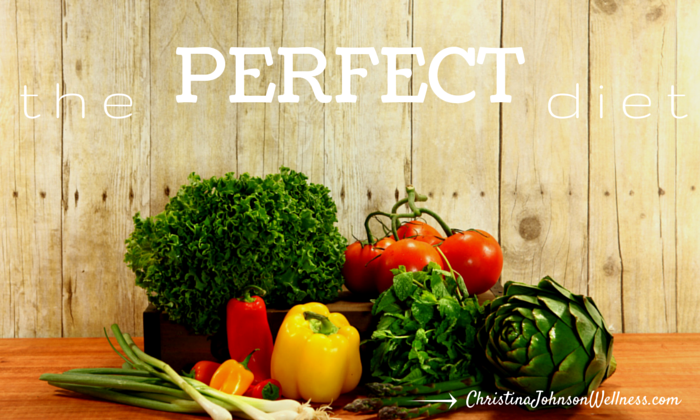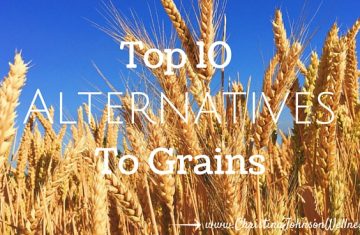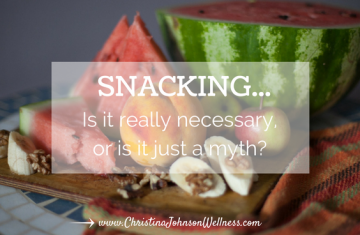For years, I searched for what I could consider to be “The Perfect Diet”. I not only searched, but I also experimented on myself. I tried a low calorie diet, a low fat diet, a Mediteranean diet, the Paleo diet, and so on.
With each new diet I tried, I hoped that I had finally found the answer to all of my dieting woes. I have to admit that during those years of experimentation, I wasn’t concerned about my overall health, preventing disease, or improving my quality of life. My primary concern was simply to attain whatever magical number on the scale that I decided I needed to reach.
Many of the diets that I tried had their merits. I lost weight with most of them (temporarily at least), but I still didn’t feel my best when I was on them. I didn’t always “feel” healthy. As I continued my search for the perfect diet, I kept thinking that there had to be one way of eating that was the “best”.
If there is one perfect diet, though, why is there so much conflicting research about various diets? Why does one study tout a low carb approach as ideal while another supports calorie restriction as the pinnacle form of achieving perfect health? I had a difficult time answering these questions until I began to change the way I viewed the word “diet”.
Redefining the Word “Diet”
When we hear the word “diet” today, most of us think of a temporary, prescribed way of eating that we follow in order to achieve a certain result, which is usually weight loss. Once the result is achieved, we are then free to go back to our “normal” way of eating.
Unfortunately, this definition promotes an unhealthy lifestyle and yo-yo dieting. In order to truly live a healthy life, we need to redefine the way we view this word. According to the dictionary, a “diet” actually refers to the foods that a particular person eats. It does not refer to a temporary diet, but simply to what we eat on a daily basis.
If we want to achieve true health, we need to stop putting ourselves on these short-term, restrictive diets and instead find a way of eating (or a diet, according to the true definition of the word) that we can follow every day without feeling deprived.
So, is there a perfect diet?
The Perfect Diet
No. That’s the short answer. No perfect diet exists. I know…many people who strictly follow a particular way of eating may become upset with this statement because they truly believe their way of eating is the best. And I get it. For years, I felt like there had to be one superior way of eating that would ensure that everyone could achieve their optimal weight and perfect health. And when something worked well for me, I assumed that it should work well for everyone else as well.
The more that I researched and experimented on myself, though, I finally realized that everyone is different. Our biochemistry, gut flora, exposure to toxins, antibiotic use, genetic makeup, and previous ways of eating all contribute to our bioindividuality. As a result, what works for me, may not work in exactly the same way for my husband, or my mom, or my best friend.
The nutrients needed to support a toddler will be different than those required by an endurance athlete, and the nutrients needed by an elderly cancer patient will be different than those needed by a busy mom of three kids. When put in these terms, it seems to make sense that there is not one exact way of eating that will be best for everyone.
So how do we know what to eat then if there isn’t one perfect diet for all? Well, we follow a basic template based upon several key principles that have been proven to work really well for everyone. Within this template, however, certain modifications may need to be made based upon each individual’s unique needs.
The basic template everyone should follow is based upon eating a whole foods diet. This diet revolves around real foods that can be eaten as close to their natural state as possible, with a minimal amount of processing, and extremely limited in the addition of chemicals, artificial colorings, and preservatives.
Below, I will describe all of the key principles of a healthy diet. If you’re more of a visual learner, though, you’ll be happy to know that I have condensed all of this information into a one page graphic. You can download this graphic for free here: Eat Real Food…A Diet Template.
Key Principles of a Healthy Diet
Foods to Enjoy:
- Animal Protein, such as:
- Beef, lamb, pork
- Fowl: Chicken, turkey, duck, etc
- Fish
- Eggs
- Organ meats
- Vegetables
- Eat a variety of colors of vegetables
- Lots of leafy greens
- Root vegetables
- Fermented vegetables
- Fresh or frozen is best
- Fruits
- Limit to 2 pieces of fruit per day
- Starches
- Sweet potatoes
- All varieties of squash
- Plantains
- Fats & Oils, such as:
- Butter
- Ghee
- Coconut oil
- Olive oil
- Beef tallow
- Duck fat
- Nuts and seeds
- In moderation
- Preferably raw and unsalted
- Seasonings
- Herbs & spices
- Sea salt
- Vinegar
- Mustard
- Sweeteners
- Honey (raw, local)
- Maple syrup (grade B)
- Dates (whole)
- Stevia (green leaf or extract)
- Use sparingly
- Beverages
- Filtered water
- Tea
- Kombucha
- Kefir
- Bone broth
- Red wine (in moderation)
- Gluten-free grains
- Wild rice, rice, quinoa, buckwheat
- Only if well tolerated (no digestive discomfort experienced)
- In moderation (up to one, ½ cup serving per day)
- Legumes
- Beans and lentils
- Only if well tolerated (no digestive discomfort experienced)
- In moderation (up to two or three ½ cup servings per week)
Principles to follow to ensure optimal nutrition:
- Eat high quality food:
- Try to buy grass-fed/pasture raised/organic meat
- Eat organic produce when possible
- Eat seasonally: adapt your diet to foods that are currently in season when possible
- Eat a variety of foods in a rainbow of colors
- Eat a mixture of raw and cooked foods
- Drink pure, filtered water
Foods to Avoid
Some foods are problematic in one way or another for most people. These are foods best avoided by everyone, all of the time:
- Gluten containing grains
- Wheat, barley, rye
- Be aware that gluten can be found in many unexpected processed foods!
- Refined sugar
- Soy products
- Industrial and Seed Oils
- For example: canola, soybean, corn, safflower, sunflower, margarine, trans fat, etc
- Pasteurized Dairy
Conclusion
These lists of foods to enjoy and foods to avoid are not exhaustive; however, they do cover the majority of foods that you should eat and try to avoid.
Certain foods within the list of foods to enjoy may cause symptoms for you that most other people don’t experience such as digestive distress, joint pain, and blood sugar spikes, and thus should be avoided for you personally. These are some of the personal modifications that you will discover over time as you transition to your whole foods diet.
For many people, transitioning to a whole foods diet can be extremely overwhelming. Some of the ingredients in recipes may be foreign to you, you may not know how to prepare a lot of the food, and you simply may not know where to start. On top of that, some of this advice goes against what we are told, such as: fats are evil, don’t consume too much cholesterol, and you have to eat dairy products for strong bones.
Trust me, I was in that exact same place several years ago. I have spent countless hours learning how to prepare whole foods in a healthy manner that actually taste good. I have poured over the research to make sure that what I am eating is truly healthy for me and is supported by science.
In upcoming blog posts, I will explain in more detail why we want to avoid certain foods that we are told are “healthy” (like whole grains), and why we shouldn’t be afraid of other foods (like red meat and saturated fats). I will also discuss what types of modifications certain people need to make based upon their unique needs.
Free Resource
If you would like a copy of my easy-to-read graphic, Eat Real Food…A Diet Template, which shows the foods to eat and the ones to avoid, click the button below, and I will email it to you right away!
Download the Eat Real Food Graphic
So, what do you think? Can you make the switch to a whole foods diet? Or are you already eating this way? What has been/will be the biggest challenge for you? What questions do you have about eating whole foods? Let me know in the comments below!



